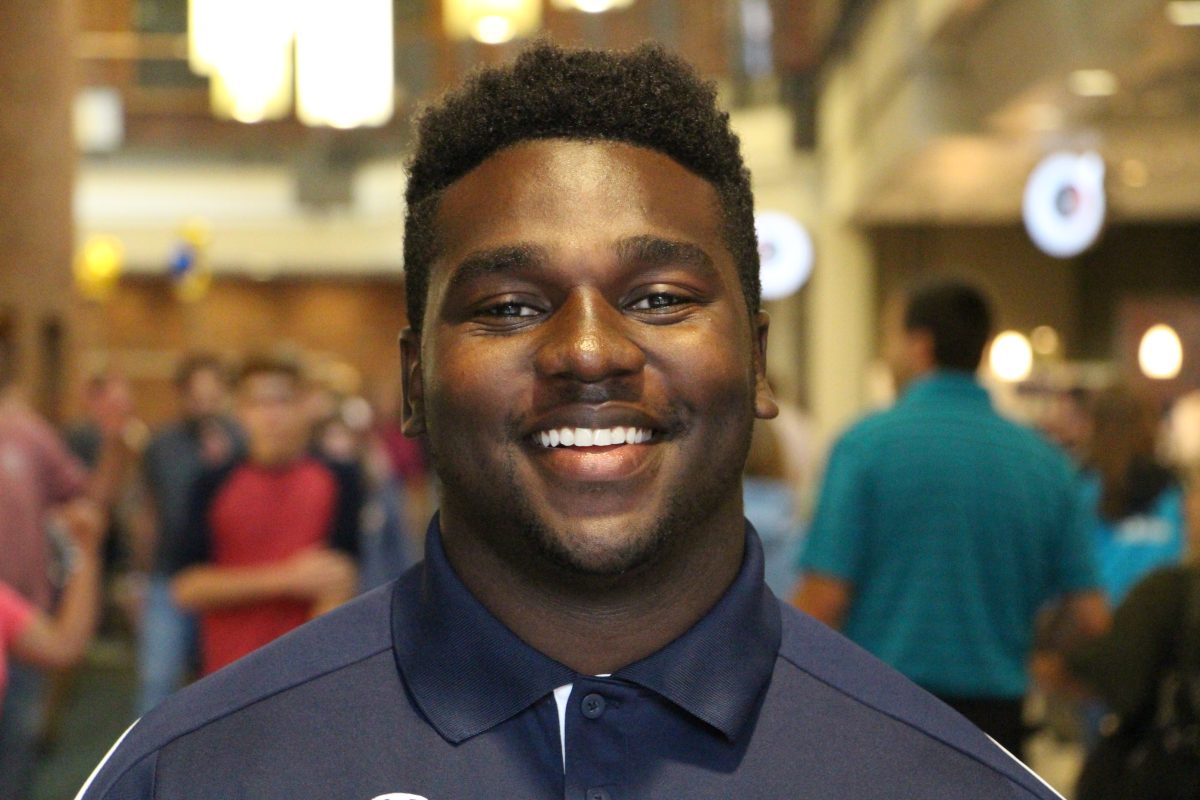At Bethel, l learned our faith stretches further outside campus.
By Godfrey Mpetey
The following is an opinion piece and does not necessarily reflect the views of The Clarion, its staff or the institution. If you would like to submit a response or an opinion piece of your own, please contact [email protected].
Last year, I dragged myself from my bed in Arden Village each Sunday, put on my wrinkled pair of chinos and Bethel football polo and went to church a few miles away from Bethel. I hesitantly stood as worship service started. I awkwardly fiddled with my hands and swayed left to right, mouthing the words of songs that all sounded the same.
As the pastor approached the pulpit, my mind vacated the building. I envisioned myself playing football, wondered if I would miss the first half of the Vikings game or if the dining center would serve wings for lunch.
When the pastor reached the stage, he welcomed the congregation. That day, I was eager to hear his message during a turbulent political time. As he began his sermon and read scripture, he paused to address the community about our country.
“Regardless of who’s president, Jesus is always our king,” he said.
Instantly, my head shifted toward the pastor and around to the surrounding people in the seats. Did he really say that? That was the bleakest response towards injustices happening not only in our world but our community.
This moment I realized I had been attending church not for what I needed, but to fulfill a task. I could say I didn’t do an assignment. I could say I didn’t do my laundry. But at least I could say I went to church.
Growing up, my family didn’t hold faith as a priority. Both of my parents grew up in families heavily involved in the church. However, besides the Ghanaian gospel music echoed throughout our house, their work schedules and constant moving homes didn’t allow us to establish a church home. During this time, my sister Geraldine became the only active Christian in the family.
She frequently attended church on Wednesday nights for youth group. As the youngest, I routinely played ‘follow the leader’ and joined her. However, we weren’t placed in the same group. I joined Stockade, an all-boys program which starkly compared to the Eagle Scouts. Each week, we wore starchy blue button up with “MPETEY” embroidered into the chest.
Stockade leaders – most of them the fathers of the boys – helped us construct the typical, manly Christian things such as tool boxes and model car kits. We played dodgeball and kickball to release our pubescent energy.
During Stockade, we were given study Bibles, which featured pictures and activities to be completed by the following Wednesday. From time to time, I’d gaze through the book. Most of the pages depicted Jesus outlined in blue ink with the white page behind him acting as his skin.
By fulfilling these activities, you received badges that were sewn onto your shirt to signify your allegiance to study the Word. My shirt remained bare much throughout my time in Stockade.
Each lesson flew through one ear and oozed out the other. I lacked the zest to fully participate in activities that focused on becoming Christ-centered. What kept me coming back to church? Was it the fellowship of believers? Was it the youth leaders shaping our faith journey? Was it the brown sugar cinnamon Pop Tarts that were sold at the concession stand?
It was definitely the Pop Tarts. I didn’t know how many disciples Jesus had, but I knew that 75 cents bought me those sugary, sweet pastries.
As I conclude my final semester of college, I’m given the ability to see how faith is interpreted here. At Bethel, people are more concerned of creating a facade than actually discovering their ways of reaching a relationship with Christ.
We attend chapel weekly, worship at Vespers, fundraise for our missions trips, but are we doing to connect with God? Or are we just upholding our facade as the “good Christians?”
To me, more people are concern about being a good Christian than they are following in how Christ lived.
I’ve seen and heard detrimental rhetoric towards minorities such as LGBTQ, people of color, different political ideologies and religions. This has led me to question how these individuals can see a loving Christ within their backwards theology.
People shout “Amen!” to love thy neighbor. We preach to hate sin, but love the sinner. But do Christians teach ourselves to love our neighbor even though they hold a contrasting sexual preference? Do Christians taught to love sinners really know how to love sinners?
In my departure from Bethel, I leave still seeking a faith of my own. I approached Bethel with an open mind but I’m remiss to say Christianity doesn’t look like this outside of these walls. So I challenge Bethel with this:
Stop seeking to be fulfilled by your badges. Remove this facade of the “good” Christian and become more like Christ.

![Nelson Hall Resident Director Kendall Engelke Davis looks over to see what Resident Assistant Chloe Smith paints. For her weekly 8 p.m. staff development meeting in Nelson Shack April 16, Engelke Davis held a watercolor event to relieve stress. “It’s a unique opportunity to get to really invest and be in [RAs’] lives,” Engelke Davis said, “which I consider such a privilege.”](http://thebuclarion.com/wp-content/uploads/2024/05/041624_KendallEngelkeDavis_Holland_05-1200x800.jpg)















